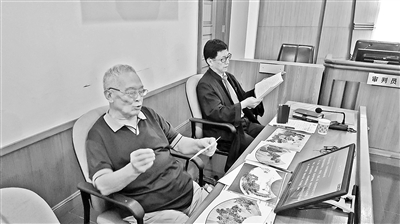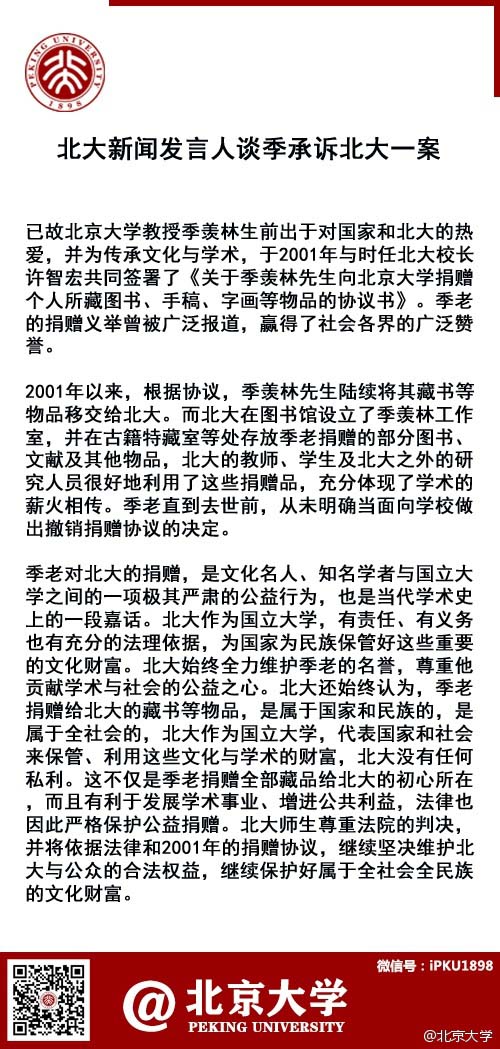


In the wake of controversy over his late father's donations, Ji Xianlin's son, Ji Cheng, filed a lawsuit against Peking University. On Aug. 16, Beijing First Intermediate People's Court announced its judgment, rejecting Ji Cheng's claim.
Dubbed a "master of Chinese culture" and a "national treasure," former professor Ji Xianlin signed a convention on July 6, 2001, authorizing the donation of a selection of antiques, calligraphy and paintings to Peking University.
In December 2008, Ji Xianlin wrote a will indicating that the books and antiques were being maintained by the Peking University library, but that they were not donations. He deputized his son to deal with the execution of the will. After Ji passed away at the age of 98, his son argued that the donation was illegal. Ji Cheng explained that he was unable to reach an agreement with Peking University. Therefore, after three years, he turned to legal proceedings to resolve the disagreement.
However, the court has determined that, on the legal basis of the convention that Ji Xianlin willingly signed, even Ji Xianlin himself cannot cancel the convention. This means that Ji Cheng does not have the right to demand the return of the donated items. The court not only rejected Ji Cheng's appeal, it also determined that he should pay 540,000 yuan for the litigation fee.
Ji Cheng nevertheless maintains that the convention was illegal.
"Firstly, the donation included my mother's belongings. Besides, there were no signatures on the convention. Moreover, Peking University once said that the donations belonged to my father and that he could deal with them on his own. However, the university doesn't dare to make that record public," Ji Cheng said.
Peking University shared a post on its official Weibo, emphasizing that Ji XIanlin did not express a wish to invalidate the convention before passing away.

Peking University's post on its official Weibo
 World's fastest bullet train to start operating next month
World's fastest bullet train to start operating next month Huangluo: China's 'long hair village'
Huangluo: China's 'long hair village' Spectacular bridge with one of the tallest piers in the world
Spectacular bridge with one of the tallest piers in the world Magnificent view of Hukou Waterfall
Magnificent view of Hukou Waterfall A glimpse of Stride 2016 Zhurihe B military drill
A glimpse of Stride 2016 Zhurihe B military drill US Navy chief tours Liaoning aircraft carrier
US Navy chief tours Liaoning aircraft carrier Chinese American woman wins Miss Michigan
Chinese American woman wins Miss Michigan Centenarian couple takes first wedding photos
Centenarian couple takes first wedding photos Traditional Tibetan costumes presented during fashion show
Traditional Tibetan costumes presented during fashion show Top 10 livable Chinese cities
Top 10 livable Chinese cities Top 20 hottest women in the world in 2014
Top 20 hottest women in the world in 2014 Top 10 hardest languages to learn
Top 10 hardest languages to learn China’s Top 10 Unique Bridges, Highways and Roads
China’s Top 10 Unique Bridges, Highways and Roads Road-straddling vehicle hits jam amid scam, feasibility claims
Road-straddling vehicle hits jam amid scam, feasibility claims TCM cupping technique lures foreign doctors to learn and practice in China
TCM cupping technique lures foreign doctors to learn and practice in China Abe’s true nuclear ambitions laid bare
Abe’s true nuclear ambitions laid bare Chinese public unfazed by sluggish medal winning at Rio Games
Chinese public unfazed by sluggish medal winning at Rio GamesDay|Week